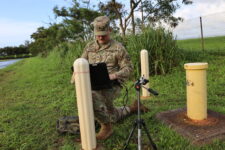
Washington: Sometimes the Pentagon is just too easy to make fun of. While it is filled with Americans good and true who work their rear ends off to help keep us safe, it also has very little idea where the hundreds of billions that it gets from Congress is going.
“I’m cautiously optimistic [they can pass an audit by 2017] but I know we need to pick up the pace,” Pentagon Comptroller Bob Hale said at the end of a rare hearing on financial management by the Senate Armed Services subcommittee on readiness and management support. Hale said he will meet next week with Defense Secretary Leon Panetta to discuss the problem
The hearing, chaired by Sen. Claire McCaskill, a former auditor and self-proclaimed good government guru, made it very clear just how tentative is the Pentagon’s march forward to being able to tell where its money is going and when.
“This hearing goes to the heart of the fiscal crisis we face as a nation,” Sen. Kelly Ayotte of New Hampshire said at the beginning of the hearing. “to distinguish between necessary defense budget cuts and cuts that would harm our troops and damage readiness, we must have reliable financial data and effective business processes and systems.”
McCaskill put the problem simply, saying it’s “impossible” for the military “to get answers to questions such as, how much money do we have and how many people do you have.” She ticked off a few statistics, noting there are more than 2,000 business systems, 335 financial management systems, and — our personal favorite — 281 weapons acquisition management systems.
A member of the audience who deals with these issues made clear just how dysfunctional the system really is. Each service, eager to preserve its culture and its budget, tracks things differently. For example, the Marines track their pistol as the M-7. The Army lists is it as a pistol. “We don’t use the same terms,” this source said. All this makes it almost impossible to accurately track what is in the field or in depots or is destroyed or lost, a failing of the Defense Department that has been regularly chronicled but never really addressed.
Meanwhile, an independent auditor is combing through the Army’s books to see if its General Fund Enterprise Business System works well enough to be auditable. The Navy and Air Force are pursuing smaller but similar efforts. And much of the planning for $400 billion in defense cuts will have to be done even though the Pentagon doesn’t really know where its money is going — until 2017, maybe.
We fed every 2024 Pentagon briefing into ChatGPT. Here’s what it thought.
The US national security establishment is cautiously embracing generative AI, so Breaking Defense decided to do an experiment.


























